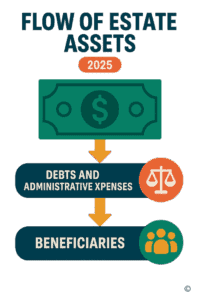Navigating Probate Costs After a Loss

Losing a loved one is incredibly difficult. On top of the emotional burden, you might find yourself navigating the complex legal process of probate to settle their affairs. A common concern that often arises is about the costs involved, especially who pays for the probate attorney.
It’s a crucial question, as understanding these fees is essential for anyone appointed as an executor or administrator. Knowing how legal expenses are handled helps us manage the estate’s finances wisely and fulfill our duties effectively.
In this comprehensive guide, we will break down the fundamental rule of who pays probate attorney fees. We’ll explore common fee structures, discuss factors that influence costs, and highlight other expenses you might encounter. Our goal is to provide you with clear, practical information to steer this aspect of estate administration with confidence.

Losing a loved one often brings with it not only profound grief but also unexpected financial stress as you begin to untangle their estate. The probate process, while necessary for the orderly transfer of assets and settlement of debts, can seem daunting, especially when faced with the question of legal fees. As attorneys who have guided many families through this challenging period, we understand that dealing with finances is often the last thing on your mind when you’re grieving. Our role is to simplify this complex process, ensuring that the estate’s administrative expenses, including attorney fees, are handled efficiently and transparently.
The administration of an estate involves many steps, from identifying and valuing assets to paying creditors and distributing inheritances. Each step carries potential costs, and understanding the flow of these expenses is crucial. The good news is that the burden of these costs typically does not fall on the shoulders of the executor or personal representative personally. Instead, a clear hierarchy of payment ensures that the estate itself covers the necessary expenses. This structure is designed to protect the individuals stepping into the role of managing the deceased’s affairs, allowing them to focus on their fiduciary duties without personal financial strain.

This infographic illustrates a fundamental principle: the estate’s assets are first used to cover its debts and administrative expenses, including legal fees, before any distributions are made to beneficiaries. This systematic approach ensures that all necessary costs for administering the estate are met, allowing for a proper and lawful transfer of assets to those entitled to them. It underscores the importance of proper estate planning and administration to minimize potential complications and maximize the inheritance for the heirs.
The Fundamental Rule: The Estate Pays the Bill
The most fundamental principle in probate law regarding attorney fees is that the deceased person’s estate is responsible for paying them. These fees are considered an administrative expense of the estate, much like court filing fees or appraisal costs. This is a core principle in probate law across the country, ensuring that the person managing the estate isn’t personally burdened by the necessary legal costs. The executor or personal representative, acting on behalf of the estate, arranges for these payments from the estate’s assets. This ensures that the legal work required to settle the estate benefits the estate as a whole and is paid for by the assets it contains, rather than by the individuals who are managing or inheriting from it.
The rationale behind this rule is straightforward: the legal services provided by a probate attorney are for the benefit of the estate itself. The attorney helps steer the complex legal requirements of probate, ensuring that the deceased’s debts are paid, assets are properly identified and valued, and remaining property is distributed according to the will or state law. Without these services, the estate might not be properly administered, potentially leading to disputes, delays, or even legal challenges. Therefore, the cost of these essential services is logically borne by the entity that benefits from them – the estate.
Who pays probate attorney fees and how are they sourced?
As established, the estate pays probate attorney fees. These fees are sourced directly from the deceased’s assets. This can include funds from bank accounts, proceeds from the sale of real estate, investment accounts, or other liquid assets held by the estate. The executor or personal representative uses the deceased’s assets to cover these expenses before any inheritance is distributed to beneficiaries or heirs. This means that while beneficiaries do not directly pay the attorney, the fees do reduce the overall value of the estate available for distribution.
For example, if an estate primarily consists of a house and a bank account, the attorney fees would typically be paid from the bank account. If the bank account is insufficient, the attorney fees might be paid from the proceeds of the sale of the house. This deferred payment structure is common in probate, as attorneys often understand that estate assets may not be immediately liquid. Understanding how probate fees are paid is a key responsibility for any estate administrator, as it directly impacts the net inheritance for the heirs. For a detailed breakdown of this process, you can find more information on who pays probate attorney fees.
Are there exceptions where someone else pays?

While the general rule is that the estate pays, there are specific, albeit rarer, exceptions where someone else might bear the cost of probate attorney fees, at least initially or in certain circumstances.
One common scenario involves will contests or estate litigation. If a beneficiary or an heir initiates a legal challenge, such as contesting the validity of a will or disputing the actions of the executor, the court may, in some cases, order that individual to pay the estate’s legal fees if their claim is found to be without merit, frivolous, or brought in bad faith. This serves as a deterrent against unnecessary or vexatious litigation that drains estate resources. Conversely, if the challenging party prevails, the court might order the estate to cover their legal fees, or even the opposing party’s fees, depending on the specifics of the case and state law.
Another exception arises when there’s a lack of liquid assets in the estate. Sometimes, an estate might be asset-rich (e.g., owning valuable real estate) but cash-poor. In such instances, an heir, beneficiary, or even the executor might advance funds for initial court costs or attorney retainers, with the clear understanding and expectation of being reimbursed once estate assets are liquidated. This is typically a temporary measure to get the probate process moving, and the advanced funds are usually repaid from the estate once sufficient liquidity is established. However, if the estate ultimately proves to be insolvent, the individual who advanced the funds might not be fully reimbursed.
Furthermore, in cases where an estate is insolvent (meaning its debts and administrative expenses exceed its assets), an attorney might require an upfront retainer from the person wishing to open the estate. This is because there’s no guarantee that the estate will generate enough funds to cover the attorney’s fees. In these situations, the individual initiating probate would be personally responsible for that initial retainer, though they would still seek reimbursement from any available estate funds first.
It’s also important to distinguish between fees for the estate’s attorney and fees for an individual’s personal attorney. If a beneficiary hires their own attorney to represent their individual interests (e.g., to review documents, provide advice, or negotiate on their behalf), those fees are typically the personal responsibility of that beneficiary and are not paid by the estate unless specifically ordered by a court in a particular type of dispute.
These exceptions highlight the importance of clear communication and understanding of legal agreements, especially when dealing with complex estate matters or potential disputes.
How Probate Attorneys Structure Their Fees
Transparency in fee agreements is paramount when engaging a probate attorney. We believe that clients should have a clear understanding of how legal costs are calculated from the outset. In my practice in Arizona, the law requires attorney fees to be reasonable for the services rendered, a standard that protects the estate and its beneficiaries. This “reasonableness” is assessed based on several factors, including the complexity of the case, the time and labor required, the attorney’s experience and reputation, and the customary fees for similar services in the community.
We strive for clear communication about costs from the very beginning, often using flexible options to alleviate financial pressure on the family during what is already a stressful time. This commitment to upfront clarity helps manage expectations and fosters trust between the attorney and the executor. It’s crucial for executors to ask detailed questions about fee structures, potential additional costs, and billing practices before formally engaging an attorney. A well-drafted fee agreement should outline all these details, providing a roadmap for the financial aspects of the probate journey.
[TABLE] comparing Fee Structures: Hourly vs. Flat Fee vs. Percentage
Probate attorneys generally employ a few common fee structures, each with its own advantages and suitability depending on the nature of the estate. Understanding these options is key to making an informed decision.
Fee Structure How It Works Best For… Hourly Rate The attorney bills for the actual time spent working on the case, typically in small increments (e.g., 6-minute units). The rate can vary significantly based on the attorney’s experience, location, and the complexity of the work. Complex cases with an unknown amount of work, potential for disputes, or where the scope of work is difficult to predict upfront. This is a common structure in Arizona, with probate attorneys typically charging $150–$500 per hour. Flat Fee A single, fixed price is agreed upon for handling the entire probate process, or specific defined stages of it. This fee covers all legal services for the agreed-upon scope, regardless of the actual time spent. Simple, uncontested estates with predictable tasks and clear assets, where the attorney can accurately estimate the total work involved. In Arizona, flat fees for uncontested cases can range from $3,000–$7,000. Percentage Fee The attorney’s fee is calculated as a percentage of the gross value of the estate’s assets (or sometimes just the probate assets). This structure is often statutory in some states. (Varies by state) Some states, like California, use a statutory fee schedule. In Arizona, percentage-of-estate fees are rare for probate attorneys, though they are common for individual trustees managing trusts, who may charge up to $75/hour for their services. For clients with financial constraints, particularly in litigation scenarios, contingency fee arrangements are available. Under this structure, clients pay nothing unless the case is successful, and the attorney receives a percentage of the recovery. This is typically reserved for contested matters where a monetary award is the goal. Additionally, we offer a deferred hourly payment option where fees can be paid from the sale of a probate asset, like a house, once it’s sold and the estate has sufficient liquidity. This provides flexibility and reduces the immediate financial burden on families.
What factors influence the total cost of fees?

The total cost of probate attorney fees is not a one-size-fits-all figure; it’s influenced by a multitude of factors, primarily revolving around the complexity of the estate and the efficiency with which it can be administered.
1. Estate Complexity: This is perhaps the most significant factor. * Size and Nature of Assets: An estate consisting solely of a bank account and a simple home will be less complex than one with multiple properties, diverse investment portfolios, business interests, or valuable collectibles. Each type of asset requires specific valuation and transfer procedures. * Debts and Creditors: An estate with numerous outstanding debts or complex creditor claims (e.g., multiple mortgages, business liabilities, or disputed bills) will require more attorney time to manage and resolve. * Existence and Clarity of a Will: If a valid, clear, and uncontested will exists, the probate process is generally smoother and less costly. If there’s no will (intestacy), the attorney must work under state intestacy laws to identify heirs, which can be time-consuming. An unclear or poorly drafted will can also lead to increased legal work. * Number of Beneficiaries/Heirs: More beneficiaries or heirs often mean more communication, more potential for disagreements, and more complex distribution logistics. * Out-of-State Assets: If the deceased owned property in multiple states, ancillary probate proceedings might be necessary in each state, significantly increasing legal fees.
2. Litigation and Disputes: This factor can dramatically inflate costs. If disputes arise among heirs, beneficiaries, or creditors, or if the will is contested, the attorney will need to engage in negotiation, mediation, or full-blown litigation. These processes are inherently time-consuming, involve extensive legal research, court appearances, and potentially expert witnesses, all of which drive up fees. This is where contingency fee arrangements might come into play, especially if there’s a significant monetary dispute.
3. Attorney Experience and Location: More experienced and specialized probate attorneys, particularly those in larger metropolitan areas, tend to have higher hourly rates. However, their expertise can sometimes lead to a more efficient and quicker resolution of complex issues, potentially saving money in the long run compared to a less experienced attorney who takes longer or makes errors.
4. Executor’s Organization and Cooperation: An organized executor who provides necessary documents promptly, communicates clearly, and avoids unnecessary calls or requests can help streamline the process and reduce attorney time. Conversely, disorganization or a lack of cooperation can lead to delays and increased fees.
5. Court System and Local Rules: The specific probate court’s procedures, caseload, and local rules can also impact the duration and complexity of the process, indirectly affecting attorney fees.
Considering these factors, it becomes clear why the amount of probate attorney fees can vary so widely. The size and nature of the assets, the number of creditors to notify, and whether disputes arise among heirs all play a significant role in the final cost.
Beyond the Lawyer: A Look at Other Probate Expenses
While probate attorney fees often represent a significant portion of the overall costs, it’s crucial for executors and administrators to understand that they are not the only expenses involved. The estate is also responsible for several other administrative costs that are a necessary part of the process. Failing to budget for these additional expenditures can lead to unexpected financial strain or delays in settling the estate. These expenses are also typically paid from the estate’s assets, reducing the amount available for distribution to beneficiaries. A comprehensive understanding of all potential costs allows for more accurate financial planning and a smoother probate experience.
[LIST] of Common Additional Probate Costs
- Court Filing Fees: These are mandatory fees paid to the probate court to initiate and manage the case. They cover the cost of filing the petition to open probate, various motions, and other necessary documents throughout the process. These fees vary by state and county but are a universal part of formal probate.
- Executor/Personal Representative Fees: The individual appointed to manage the estate (executor in a will, administrator without one) is entitled to compensation for their time, effort, and responsibility. State laws often set guidelines for these fees, which can be a percentage of the estate’s value, an hourly rate, or a reasonable amount approved by the court. While family members often waive this fee, especially for smaller estates, it’s a legitimate expense. In Arizona, individual trustees, who might perform similar administrative duties for a trust that avoids probate, may charge up to $75/hour.
- Appraisal and Valuation Fees: For estates that include real estate, valuable personal property (e.g., art, jewelry, antiques), business interests, or complex financial assets, professional appraisals are often required to determine their fair market value as of the date of death. This is crucial for tax purposes and for equitable distribution among beneficiaries. Appraisers charge fees for their services based on the complexity and volume of assets.
- Surety Bonds: In many jurisdictions, especially if the will does not waive it or if there is no will, the court may require the executor or administrator to obtain a surety bond. This is essentially an insurance policy that protects the estate and its beneficiaries from potential mismanagement or malfeasance by the personal representative. The cost of the bond is typically an annual premium paid from the estate’s funds.
- Accounting and Tax Preparation Fees: The estate will need to file the deceased’s final personal income tax returns (Form 1040) and potentially an income tax return for the estate itself (Form 1041) if it generates income during administration. If the estate is large enough, federal (and some state) estate tax returns (Form 706) may also be required. Professional accountants or tax preparers are often hired to handle these complex filings, and their fees are paid by the estate.
- Publication Fees: In many states, the executor is required to publish a notice to creditors in a local newspaper, informing potential claimants of the deceased’s passing and the opening of probate. This allows creditors to come forward and make claims against the estate within a specified timeframe. The newspaper charges a fee for this publication.
- Miscellaneous Administrative Costs: This category can include a variety of smaller expenses such as postage, copying fees, notary fees, record-keeping supplies, storage costs for personal property, and fees for certified copies of death certificates or court documents. While individually small, these can add up over the course of probate.
Understanding and anticipating these additional costs is just as important as understanding attorney fees. They are all legitimate expenses that reduce the net value of the estate before final distribution to beneficiaries.
Frequently Asked Questions about Who Pays Probate Attorney Fees
Navigating the financial aspects of probate can raise many questions. Here, we address some of the most common inquiries regarding who pays probate attorney fees and related financial considerations.
What happens if the estate doesn’t have enough money to pay the attorney?
This is a critical concern, particularly for smaller estates or those with significant debts. If an estate is insolvent (meaning its total debts and administrative expenses exceed the value of its assets), the situation becomes more challenging. However, probate attorney fees are considered a high-priority administrative expense. This means they are typically paid before most other creditors (like credit card companies or utility providers) and long before any beneficiaries receive assets.
In cases where the estate is truly insolvent and lacks sufficient liquid funds, an attorney may not be able to take the case without some assurance of payment. In such scenarios, they might require an upfront retainer from the person wishing to open the estate. This individual would be personally responsible for that initial payment, understanding that reimbursement from the estate is unlikely if there are no assets. Alternatively, if there are illiquid assets like real estate, a deferred hourly payment option might be arranged, where fees are paid from the proceeds of the asset’s sale. If the estate ultimately cannot cover the fees, the attorney may have to write off the remaining balance, as they cannot pursue the executor or beneficiaries personally for the estate’s debt unless there was a specific personal guarantee.
Can I negotiate the probate attorney’s fee?
Yes, in many situations, probate attorney fees are negotiable. This is especially true for hourly and flat-fee arrangements, which are common in Arizona. While statutory fee schedules exist in some states, in Arizona, fees must be “reasonable,” which allows for discussion. It’s wise to discuss fees with a few different attorneys during initial consultations to compare their proposed structures, rates, and what services are included.
As an executor or administrator, you have a fiduciary duty to the estate. This means you are legally obligated to act in the best interests of the estate and its beneficiaries. Part of this duty includes ensuring that all costs, including legal fees, are reasonable and necessary. Therefore, negotiating fees is not only permissible but often a responsible exercise of your fiduciary duty. Don’t hesitate to ask for a clear, written fee agreement that outlines the scope of work, billing rates, and any potential additional costs. If you feel the fees are excessive, you have the right to challenge them in court, though this should be a last resort after attempting negotiation.
Do I have to pay a retainer fee upfront for probate?
Whether you have to pay a retainer fee upfront for probate depends on several factors, including the attorney’s policy, the specifics of the estate, and the nature of the legal work required.
For many straightforward probate cases where the estate has sufficient assets, our firm and many others will defer payment until the estate’s assets are accessible. This means the attorney begins work, and their fees are paid later from the estate’s funds once they become liquid (e.g., after bank accounts are unfrozen or assets are sold). This is often preferred by families as it alleviates the immediate financial burden during a difficult time.
However, there are situations where an upfront retainer may be required:
- Lack of Liquidity: If the estate has very few liquid assets (cash in bank accounts) at the outset, an attorney might request a retainer to cover initial court filing fees and a portion of their work until assets can be converted to cash.
- Contested Matters/Litigation: If the case involves a will contest, disputes among heirs, or other forms of litigation, attorneys often require a retainer. These cases are unpredictable in terms of time and effort, and the retainer ensures that legal services can continue without interruption. For such litigation, contingency fee arrangements might also be discussed.
- Insolvent Estates: As mentioned earlier, if the estate appears to be insolvent or has very limited assets, an attorney might require an upfront retainer from the individual seeking to open probate, as there’s no guarantee the estate will generate funds to pay the fees.
- Attorney’s Policy: Some attorneys simply have a policy of requiring an upfront retainer for all new cases, regardless of the estate’s liquidity.
It’s crucial to discuss the payment structure, including any retainer requirements, during your initial consultation with a probate attorney. Ensure that any retainer agreement clearly states how the funds will be held (typically in a client trust account) and how they will be billed against.
Conclusion: The Estate Bears the Cost, the Executor Manages It

The question of “who pays probate attorney fees” has a straightforward answer: the estate does. These legal costs are considered a necessary administrative expense, paid from the deceased’s assets before any final distribution to beneficiaries. This fundamental principle ensures that the person stepping into the role of executor or administrator is not personally burdened by the financial demands of navigating the legal process.
However, while the estate picks up the tab, the process involves careful and diligent management by the executor. Your role as the personal representative is crucial in overseeing these costs, ensuring they are reasonable, and ultimately protecting the estate’s value for the beneficiaries. This involves understanding the various fee structures employed by probate attorneys – from hourly rates (typically $150–$500/hour in Arizona) to flat fees ($3,000–$7,000 for uncontested cases) – and recognizing when other options like deferred hourly payments or contingency fees (for litigation) might be applicable.
Beyond attorney fees, executors must also anticipate and manage other probate expenses, such as court filing fees, appraisal costs, and potential compensation for the executor themselves (up to $75/hour for individual trustees in Arizona). Maintaining clear communication with your attorney, asking detailed questions about billing, and obtaining a comprehensive written fee agreement are best practices that will serve both you and the estate well.
By understanding the fee structures, anticipating all costs, and maintaining clear communication with your attorney, you can steer the financial aspects of probate with confidence and fulfill your fiduciary duties to the estate and its beneficiaries effectively. This careful management ensures a smoother estate settlement and a more transparent final distribution.





